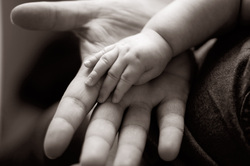
Babies' foundational way of knowing and experiencing the world is through their primary caregiver/s. The bond between the infant and their primary caregiver/s (commonly referred to as attachment) plays a huge role in an infant's mental and physical health. This bond can be disrupted for various reasons: due to difficulties within the infant (such as medical problems), difficulties within the primary caregiver/s (for example depression or loss) or in the dynamics between infant and caregiver (for instance a baby with a difficult temperament and a mother with low internal resources due to stressful circumstances).
Due to the importance of this bond and the baby not being able to experience psychotherapy by themselves, a strategic intervention for difficulties in infant (and sometimes parental) mental health is parent infant psychotherapy (PIP). In PIP both infant and parent/s are present in the room. The therapist particularly focuses on the relationship between the infant and their caregiver/s to help manage stress and work through psychological tensions in and between the baby and their caregiver/s. The therapist also provides the dyad (or triad) with support and guidance.
Columbia University's Center for Psychoanalytic Training and Research describes what parent infant psychotherapy is a different way and provides a useful case example to better understand what PIP may entail.


 RSS Feed
RSS Feed